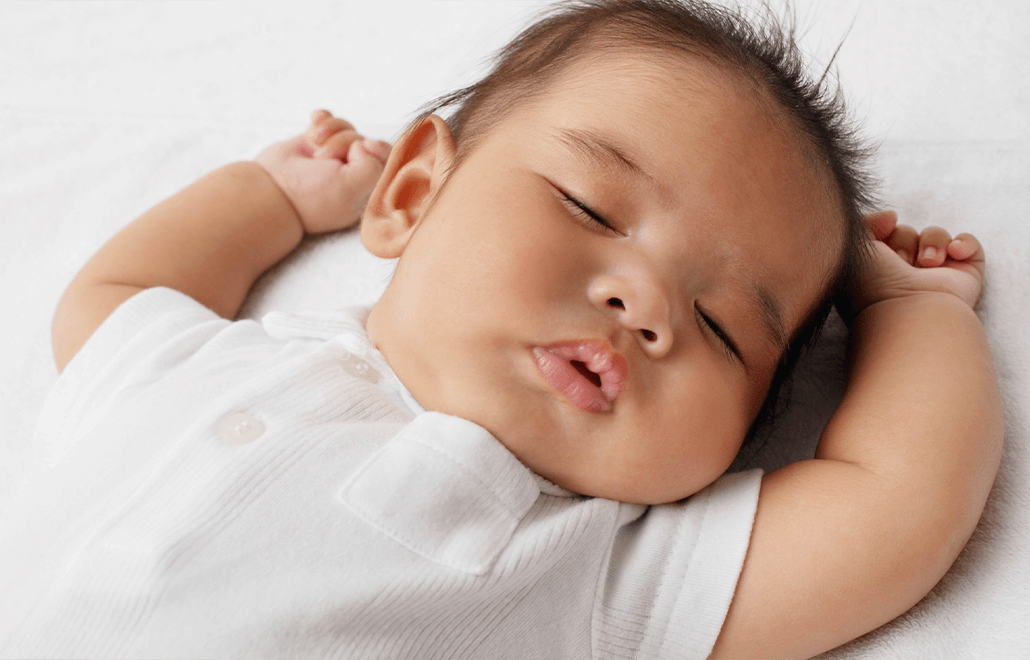
05 Sep How Should a Baby Sleep if Congested?
3 min. readCongestion can be a worrying issue for parents, especially when it affects a tiny baby. Did you know that babies can only breathe through their noses for the first year of life? That’s right! They can’t comfortably breathe through their mouths, which can lead to some noisy, congested-sounding sleep that might alarm new parents. But don’t worry—these sounds are often a normal part of infancy. Let’s explore how to help your congested baby sleep better and when to seek medical advice.
What Are These Noises All About?
When your baby inhales, their little noses filter and humidify the air. This process ensures that the air reaching their lungs is clean, free of dust, and at body temperature. However, when congestion interferes with this process, it can lead to coughing, dry mucus, and unsettling snorting sounds you might hear during sleep.
What Causes Mucus?
Mucus, often called snot, might seem unpleasant, but it plays an essential role. It acts as a sticky trap to catch dust, bacteria, and other foreign particles, preventing them from entering the lower airways. Excess mucus and congestion can result from various factors, including:
• Viruses: Colds are the most common cause of increased mucus. Babies typically experience 6-10 colds a year.
• Allergies: Although less common in young babies, allergies can be triggered by foods or indoor allergens like mold. Allergy-related mucus is usually thin and clear.
• Dry Air: Dry environments can also contribute to congestion and an increase in mucus production.
How Can I Help My Baby Breathe Better?
If your baby is congested, here’s how you can help clear their nasal passages and make it easier for them to breathe:
- Use Saline Spray: Over-the-counter (unmedicated) saline sprays are a great first step. They help loosen nasal mucus and reduce swelling in the nasal tissues. Apply the saline spray and let it sit for a few minutes to be absorbed.
- Suction Devices: After applying saline, use a suction device, such as a bulb syringe or a NozeBot (use code CARA20 for $20 off), to gently remove the loosened mucus. This helps clear the nasal passages, making breathing easier.
Safety Tip:
Parents often wonder if it’s okay to prop their congested baby in an elevated position to help with breathing. However, research shows that the safest sleep environment for babies is a firm, flat surface in a crib, bassinet, or play yard. Avoid elevating the baby’s head during sleep, as this can pose risks. For tips on helping your sick baby sleep safely, check out our blog on baby sleep and sickness.
When Should I Be Concerned About My Baby’s Breathing?
While most congested babies will recover with proper care, there are some signs that warrant a closer look:
- High-Pitched Sounds: If your baby makes high-pitched sounds while breathing, this may indicate an obstruction or a condition like croup, which is a viral respiratory infection. Consult your pediatrician if you hear these sounds.
- Signs of Dehydration: Congestion can disrupt your baby’s feeding and sleep patterns. Watch for signs of dehydration, such as fewer wet diapers, no tears when crying, and excessive tiredness. If you notice these signs, seek medical advice promptly.
- Persistent Congestion: If your baby’s congestion lasts more than two weeks, it might be a sign of a more serious issue. Consult your doctor if the congestion persists or worsens.
In summary, while congestion can be distressing, understanding how to manage it and recognizing when to seek medical help can make a big difference. By keeping your baby’s nasal passages clear and maintaining a safe sleep environment, you can help your little one breathe easier and get better rest.

